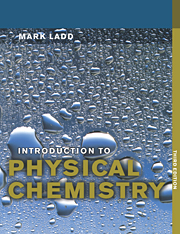Book contents
- Frontmatter
- Contents
- Preface
- Physical constants and other numerical data
- Prefixes to Units
- 1 Structure, energy, mechanism
- 2 Atoms, molecules and their structures
- 3 Determination of structure
- 4 Energy and energetics
- 5 States of matter: gases and liquids
- 6 States of matter: solids
- 7 Phase rule and properties of solutions
- 8 Chemical equilibrium
- 9 Electrochemistry
- 10 Chemical kinetics and mechanisms of chemical reactions
- Appendix 1 Problem-solving with personal computers
- Appendix 2 Stereoviewing
- Appendix 3 Average classical thermal energies
- Appendix 4 Reduced mass
- Appendix 5 Spherical polar coordinates
- Appendix 6 Gamma function
- Appendix 7 Slater's rules
- Appendix 8 Linear least squares and the propagation of errors
- Appendix 9 Determinants and cofactors
- Appendix 10 Solution of a second-order differential equation
- Appendix 11 Separation of variables
- Appendix 12 Overlap integrals
- Appendix 13 Partial derivatives
- Appendix 14 Numerical integration
- Appendix 15 Fermi-Dirac statistics
- Appendix 16 Calculation of Madelung constants
- Appendix 17 The hypsometric formula: an example of the Boltzmann distribution
- Appendix 18 Tables of physical data
- Bibliography
- Answers to numerical problems
- Index
6 - States of matter: solids
Published online by Cambridge University Press: 05 June 2012
- Frontmatter
- Contents
- Preface
- Physical constants and other numerical data
- Prefixes to Units
- 1 Structure, energy, mechanism
- 2 Atoms, molecules and their structures
- 3 Determination of structure
- 4 Energy and energetics
- 5 States of matter: gases and liquids
- 6 States of matter: solids
- 7 Phase rule and properties of solutions
- 8 Chemical equilibrium
- 9 Electrochemistry
- 10 Chemical kinetics and mechanisms of chemical reactions
- Appendix 1 Problem-solving with personal computers
- Appendix 2 Stereoviewing
- Appendix 3 Average classical thermal energies
- Appendix 4 Reduced mass
- Appendix 5 Spherical polar coordinates
- Appendix 6 Gamma function
- Appendix 7 Slater's rules
- Appendix 8 Linear least squares and the propagation of errors
- Appendix 9 Determinants and cofactors
- Appendix 10 Solution of a second-order differential equation
- Appendix 11 Separation of variables
- Appendix 12 Overlap integrals
- Appendix 13 Partial derivatives
- Appendix 14 Numerical integration
- Appendix 15 Fermi-Dirac statistics
- Appendix 16 Calculation of Madelung constants
- Appendix 17 The hypsometric formula: an example of the Boltzmann distribution
- Appendix 18 Tables of physical data
- Bibliography
- Answers to numerical problems
- Index
Summary
Introduction
A solid has a definite volume and shape, neither of which changes appreciably with changes in temperature or pressure. A study of the solid state is principally a study of crystalline materials, since almost all solids form crystals. Certain solids are described as amorphous: in some cases they are microcrystalline, but other examples, such as glass or many polymers, do not have the regularity in structure that is associated with true crystals. The term amorphous is best restricted to those solids in which order extends over only a few atomic dimensions. In crystals, the atoms or molecules are arranged on, or in a fixed relation to, the points of a Bravais lattice, where they vibrate about their mean positions. The mean positions are, normally, invariant with time, and the vibrational energy is a major contributory factor to the heat capacity of the solid.
The atomic vibrations are anharmonic (see also Section 3.6.5.1), so that an increase in temperature causes an increase in the distance between the mean positions of the atoms and the material expands. Even if the vibrations were harmonic, the increase in free energy with temperature would lead to an increase in volume, although the expansion from this source is, normally, a second-order effect.
The time-invariance of mean atomic positions may be invalidated by disorder. In some solids, atoms may exhibit free rotation (dynamic disorder) in the solid state, or they may show static disorder.
- Type
- Chapter
- Information
- Introduction to Physical Chemistry , pp. 239 - 303Publisher: Cambridge University PressPrint publication year: 1998



